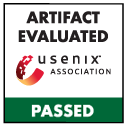Gururaj Saileshwar and Moinuddin Qureshi, Georgia Institute of Technology
Shared caches in processors are vulnerable to conflict-based side-channel attacks, whereby an attacker can monitor the access pattern of a victim by evicting victim cache lines using cache-set conflicts. Recent mitigations propose randomized mapping of addresses to cache lines, to obfuscate the locations of set-conflicts. However, these are vulnerable to newer attack algorithms that discover conflicting sets of addresses despite such mitigations, because these designs select candidates for eviction from a small set of conflicting lines.
This paper presents Mirage, a practical design for a fully associative cache, wherein eviction candidates are selected randomly from among all the lines resident in the cache, to be immune to set-conflicts. A key challenge in enabling such a design for large shared caches (containing tens of thousands of resident cache lines) is managing the complexity of cache-lookup, as a naive design can require searching through all the resident lines. Mirage achieves full-associativity while retaining practical set-associative lookups by decoupling placement and replacement, using pointer-based indirection from tag-store to data-store to allow a newly installed address to globally evict the data of any random resident line. To eliminate set-conflicts, Mirage provisions extra invalid tags in a skewed-associative tag-store design where lines can be installed without set-conflict, along with a load-aware skew-selection policy that guarantees the availability of sets with invalid tags. Our analysis shows Mirage provides the global eviction property of a fully-associative cache throughout system lifetime (violations of full-associativity, i.e. set-conflicts, occur less than once in 10^4 to 10^17 years), thus offering a principled defense against any eviction-set discovery and any potential conflict based attacks. Mirage incurs limited slowdown (2%) and 17– 20% extra storage compared to a non-secure cache.
Open Access Media
USENIX is committed to Open Access to the research presented at our events. Papers and proceedings are freely available to everyone once the event begins. Any video, audio, and/or slides that are posted after the event are also free and open to everyone. Support USENIX and our commitment to Open Access.
author = {Gururaj Saileshwar and Moinuddin Qureshi},
title = {{MIRAGE}: Mitigating {Conflict-Based} Cache Attacks with a Practical {Fully-Associative} Design},
booktitle = {30th USENIX Security Symposium (USENIX Security 21)},
year = {2021},
isbn = {978-1-939133-24-3},
pages = {1379--1396},
url = {https://www.usenix.org/conference/usenixsecurity21/presentation/saileshwar},
publisher = {USENIX Association},
month = aug
}

